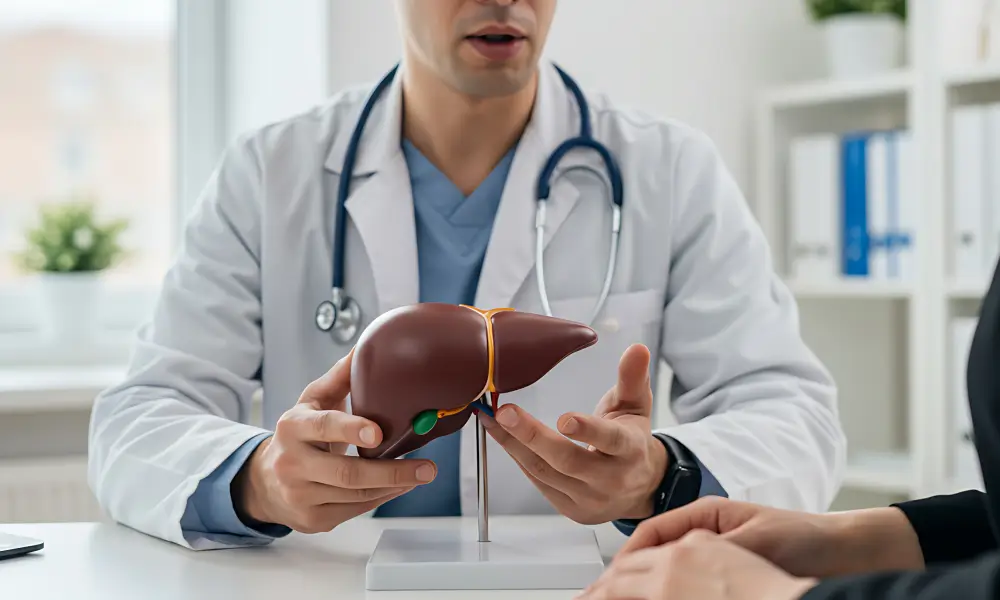A Quick Guide to Hepatitis B Treatment & Symptoms

TABLE OF CONTENTS
Introduction:
The hepatitis B virus causes hepatitis B, a potentially fatal liver illness (HBV). It is a significant issue concerning global health. It considerably increases the likelihood of cirrhosis and liver cancer-related death and can result in chronic infection.
There is a safe and reliable vaccination that provides 98% to 100% protection against hepatitis B. Consequences such as chronic sickness and liver cancer could be prevented by preventing hepatitis B infection.
The Western Pacific Region and the African Region have the greatest rates of chronic hepatitis B infection, with 116 million and 81 million individuals affected, respectively. The Eastern Mediterranean Region has 60 million infected persons, the South-East Asia Region has 18 million, the European Region has 14 million, and the Region of the Americas has 5 million.
Symptoms of Hepatitis B
Acute (short-term) hepatitis B infection is not necessarily accompanied by symptoms. For instance, it's unusual for children under the age of five to exhibit signs of infection.
If you do experience symptoms, they could be:
Jaundice is when your skin or whites of the eyes turn yellow, and the colour of your urine is either brown or orange.
Poop with a light hue
Fever
Long-lasting fatigue that lasts for weeks or months
Constipation, including anorexia, nausea, and vomiting
Belly ache
Aching joints
After contracting the virus, symptoms may not appear for one to six months. You may be feeling nothing. A third of those who have this illness are negative. Only a blood test can reveal this information.
Get in touch with your healthcare practitioner right once if you believe you have already been exposed to hepatitis B. If you get preventative therapy within 24 hours of being exposed to the virus, it can lower your chance of getting sick.
Get in touch with your healthcare practitioner if you believe you are experiencing hepatitis B symptoms.
A blood test: Acute or chronic hepatitis B can be identified by blood testing, which can also inform your healthcare professional about the condition. You can also find out if you are immune to the illness with a straightforward blood test.
A liver ultrasound: The degree of liver damage may be determined by transient elastography, a specialised ultrasound.
A liver biopsy: To screen for liver disease, your doctor could take a tiny specimen of your liver for testing. It's known as a liver biopsy. A small piece of liver tissue is removed for laboratory analysis after your doctor inserts a tiny needle through your skin into your liver during this procedure.
Risk factors of Hepatitis B infection
Contact with blood, semen, or other bodily fluids from an infected individual can transmit hepatitis B. You are more likely to contract hepatitis B if you:
Have unprotected intercourse with a number of partners or with a person who has this infection.
Share needles while using IV drugs
Cohabit with a person who has a persistent HBV infection
Are a baby delivered to a mother who has the infection
Have a profession where you are exposed to blood
Travel to places like Asia, the Pacific Islands, Africa, and Eastern Europe that have a high prevalence of HBV infection

Diagnosis of Hepatitis B infection:
Since it is impossible to distinguish between hepatitis B and other viral hepatitis on the basis of clinical findings, laboratory diagnosis of the illness is crucial. Hepatitis B patients can be diagnosed and monitored using a variety of blood tests. They can be employed to differentiate between acute and persistent infections. To maintain the safety of blood and prevent unintentional transmission, the WHO advises that all blood donors be screened for hepatitis B.
Your doctor will examine you and check for any symptoms of liver problems, such as pale skin or abdominal pain. The following tests can be used to identify hepatitis B or its complications:






